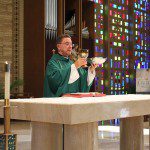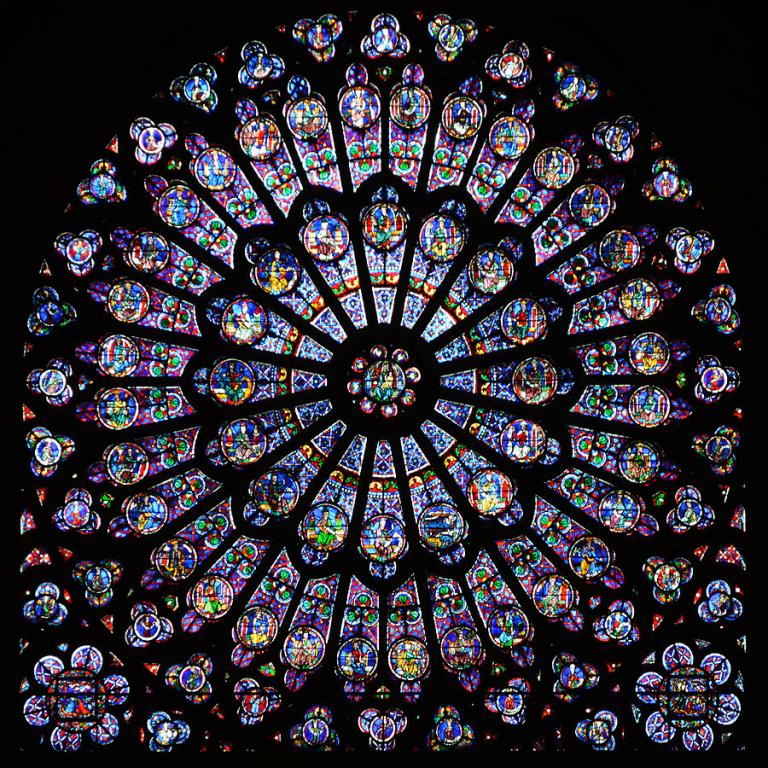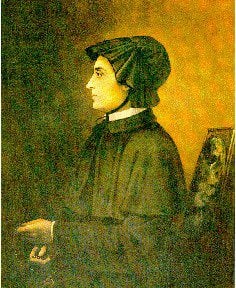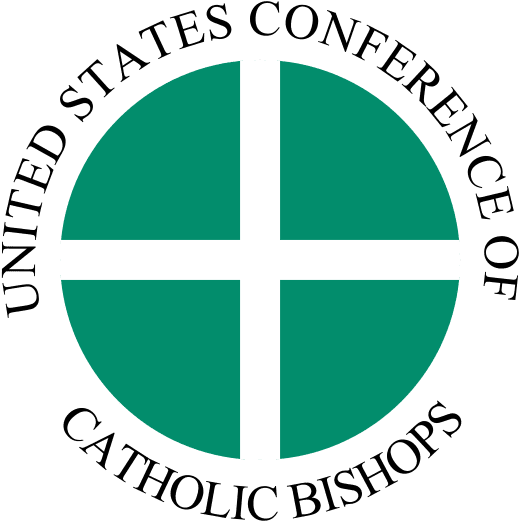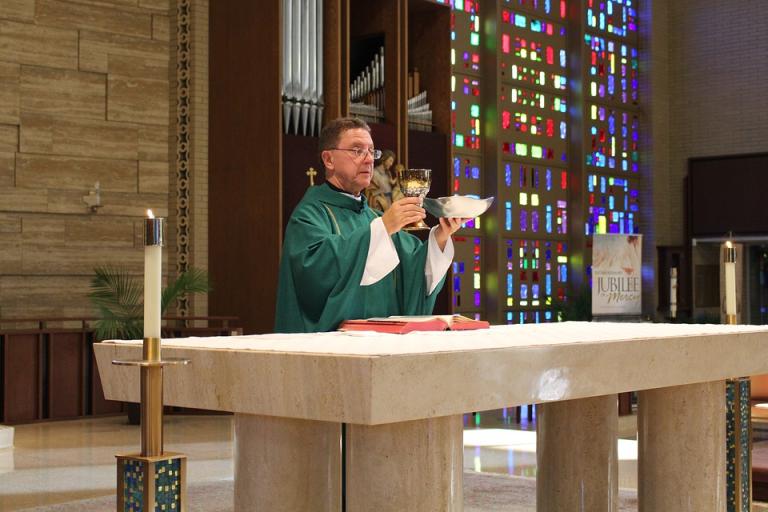
In the twitter feed today: “Critical Mass; An Austin church remakes Catholicism without the Pope, celibate priests, or most of the other rules.”
The article is about what you’d expect: an “Independent Catholic” church founded by a breakaway priest, Jayme Mathias, who has now married (another man), and focuses his ministry on Mexican immigrant Catholics. His church has grown to 215 congregants in 5 years, with 3 Spanish masses and one English one. In addition to intentionally welcoming gays, divorced/remarrieds, and the like, he tells his parishioners that, in the manner of a rolling stop at a stop sign, what matters isn’t following the “letter of the law” but “the spirit of the law” so long as no one gets hurt and your heart is in the right place.
As far as theology goes:
A significant difference between the Roman Catholic Church and the ACCUS [American Catholic Church in the United States] is their approach to the sacraments, including the Eucharist, which at Holy Family is open to all. In the Roman Catholic Church, the sacrament of confirmation is typically preceded by at least nine months of preparatory classes. At Holy Family, people can be confirmed after attending a single class. The practice allows parents to have very young children confirmed, as is typical in some parts of Mexico, and it reflects the ACCUS’s stance that the church should not place obstacles between believers and the sacraments. “The ancient church baptized, confirmed, and gave the Eucharist to people all in the same day, even to infants,” Mathias says. “Should we withhold the sacraments from certain people for ageist reasons, because they’re not yet eight years old? For sexist reasons, because we don’t ordain women? We just decided we were going to make the sacraments available to all. If you feel called in your heart to receive the Eucharist, then I am not standing between you and your God.”
The differences extend to the sacrament of holy orders, or ordination, which in the Roman Catholic Church requires an education that amounts to a college degree plus five to seven years of seminary education. Father Roy Gomez, a 71-year-old former supervisor for several Short Stop restaurants, was ordained as an ACCUS priest in 2015. He had nothing more than a high school education but had been heavily involved in ministry as a layperson at Cristo Rey and helped Mathias lead English classes for immigrants.
“You can be educated and not serve the people, but I’d rather be dumb and be able to serve,” Gomez quips. “You have to know the people, gain their trust, and show them that you care about them, and I think that if you’re able to do that, then you’re fit to be a priest.”
Now, the twitter replies pretty consistently reacted by pointing out that these people would be right at home in an Episcopalian Church. Same line up of sacraments, same order of mass (or, at least so far as I understand, the ability to reproduce the Catholic mass, or go with something more traditionally Protestant). Same blandness of theology, same openness to gay marriage and pretty much anything else. So why wouldn’t Mathias have, in fact, joined up with the Episcopalians? Take a look at the next two paragraphs:
Austin diocese spokesperson Christian González says that in the early days of Holy Family, people called the diocese frequently to ask if the sacraments they’d received there would be recognized if they returned to the Roman church. Those calls prompted priests across the diocese to read a statement from the pulpit a few years ago stating that Roman Catholics should refrain from receiving the sacraments from Mathias.
The statement had an unintended effect on some in the pews. Lifelong Catholic Mario Cruz, a 76-year-old retired school counselor, says it reminded him of growing up during segregation. “They said, ‘He is not one of us,’ ” Cruz remembers. “They said, ‘He’s not a priest, so don’t go to that church.’ And when they say don’t go, that tells me, go. Because who are they to tell me what I should do, and to exclude people?” Cruz and his wife went looking for Holy Family one Sunday and started attending regularly.
So why keep the label of “Catholic”, even if “independent Catholic” rather than Roman Catholic?
Here are my three answers:
First, it’s a brand name. From the description, it matters a great deal to their “recruitment” efforts, that they keep the label “Catholic.” It’s not about offering worship services that minister in a particular manner, it’s about offering worship services that are branded as “Catholic” so that people looking for something “Catholic” will attend and perceive of as substantially the same, offering the same spiritual graces due to that brand name, as what they’re used to.
Second, the breakaway Catholics still claim ownership of that identity, of Catholicness. To be sure, they’re not doing something wholly invalid – the Roman Catholic church doesn’t hold a trademark on the word “Catholic” and there are other religious communities that have used this label, such as the Polish National Catholic Church, and so far as I know, the Roman Catholic Church does not dispute the legitimacy of the PNCC or other groups using the label “Catholic.” But it’s my impression that the claim of “Catholic” also has an element of “you guys forced me to leave your church because your theology is wrong/you mistreat people/whatever, so I get to keep the name because I’m right and my beliefs are the truest form of what Jesus taught.” More specifically, the identity of these breakaways seems to be that of “breakaway Catholic”, and “Episcopalian” just wouldn’t do. I suspect that the Protestant willingness to just move among denominations, claiming the overall label of “Christian” but attending a Lutheran, Episcopalian, or Methodist church depending on circumstances, just isn’t a part of the worldview of these people. In a way, it’s unfortunate that they don’t seem to be able to claim that more general label of “Christian” as their identity (rather than their religion), and, at the same time, I would guess they assign to Protestants a specific identity as well, saying, “Episcopalians are rich white people, so I am not, and could not be one.”
And third, at least in the case of this priest and this church, he seems no more willing to accept an Episcopalian hierarchy than a Catholic one. Ordaining someone as priest without any theological training? Confirmation after one class? Mathias doesn’t want to be told what to do. This church, like many nondenominational Protestant churches is, despite the ACCUS label, missing the overall structure that would preserve its continuity into the next generation, or allow adherents to find a similar “church home” if they move out of town. And — near as I can tell — the church does not appear to offer any religious education classes for children, either. Is this presumed to happen in the home (which relies on the parents being informed enough themselves)? Is it presumed that all one really needs to know is what one experiences through mass attendance and homilies, because, in fact, all that matters are weekly exhortations to do good?
Now, one might say that it’s their own business, and no one else’s, if they claim the label “Catholic” but it bugs me.
In the first place, they water down what it means to be Catholic — it is more than just Apostolic Succession and saying the mass in a way that more or less follows the pattern of the Roman Catholic Church and believing in the Eucharist as, if not the True Body and Blood of Christ, then at least Really Really Important. (And on their website, they emphasize the importance of the Apostolic Succession – that is, their bishop having been consecrated by someone who, in turn, was consecrated by a “real bishop” and so on. This is, they say, the defining item of what makes a Church Catholic. Guess what? Episcopalians have this same chain.) To me the statement that what’s important is not coming to a stop at a stop sign but having your “heart in the right place” is decidedly not Catholicism — that is, a real difference between Catholicism and Protestantism is that the former says, “it’s all too easy to rationalize sinful actions, so it’s not enough to just do what feels like the right thing; you need to listen to others about what’s right and wrong.” To claim to be Catholic in this manner seems to be a misuse of the label, and suggests that the intention is to assure prospective parishioners rather than, well, to be Catholic.
And at the same time, in broadening the definition of “Catholic” they appear to discard and even de-legitimize Protestants. Their lengthy explanation of why they call themselves Catholic is written as if Protestants simply don’t exist! It also seems very contradictory to insist that they discard all of the elements of the Roman Catholic Church that they disagree with, whether it be sexual morality, or who may be ordained, or even the translation of the Roman missal, and that they proclaim that they put love of God and love of neighbor as their foremost concerns — but they won’t join with any Protestant group with whom they would be a good fit, and instead insist on a Catholic identity due to what they would surely, if observing from the outside, call the “legalism” of defining themselves by Apostolic Succession and the word “Catholic.”
image from pixabay: https://pixabay.com/en/priest-catholic-mass-host-chalice-1588892/; public domain




